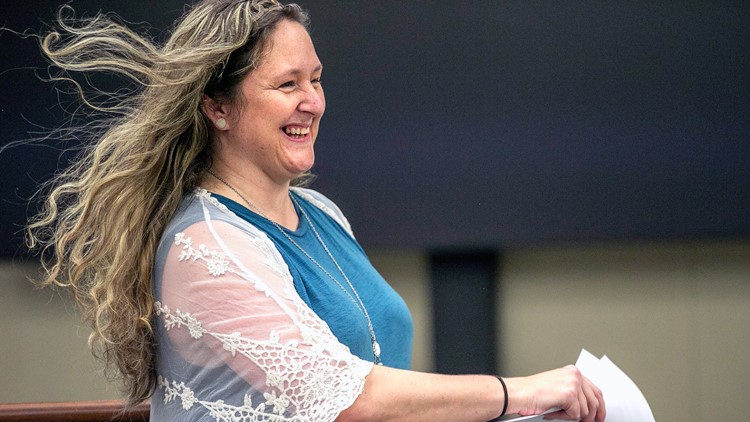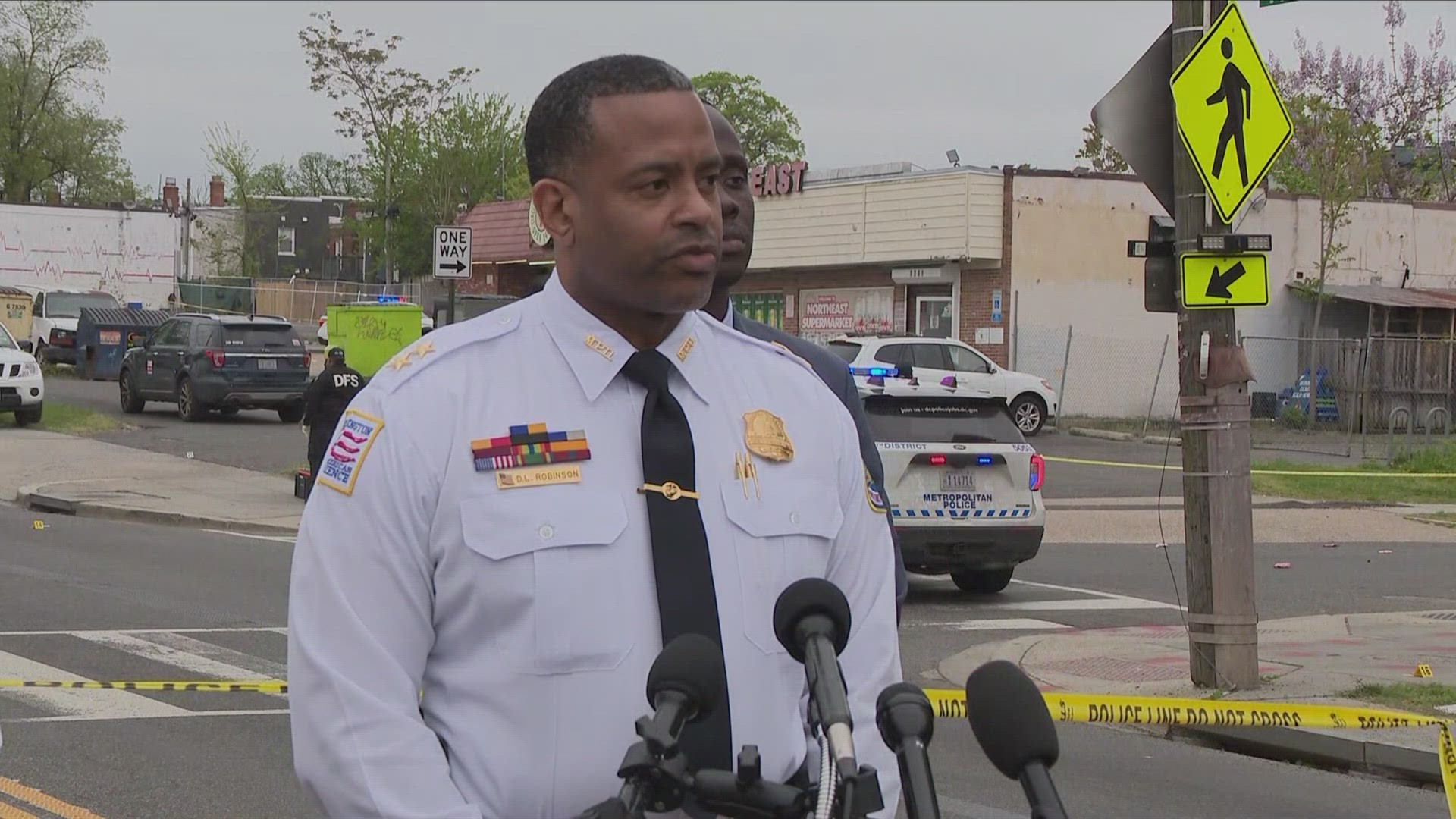FREDERICKSBURG, Va. — People typically go to court to be judged for the wrongs they've committed against society, not to be praised for being superstars.
But when a former drug addict and thief who repeatedly served jail time for her crimes use the programs and resources available to change her old ways and start anew, a court proceeding turns into a celebration.
That's what happened June 10 when Spotsylvania County native Rachel Thornsberry became the fifth person to graduate from the Rappahannock Veterans Docket, an intensive program for former military members who've gotten into legal trouble, often stemming from issues or injuries incurred during their service.
Thornsberry, 39, completed the program that involves three sessions a week of therapy and treatment, counseling and court sessions over the course of 18 months. She also checked in regularly with her mentor, another veteran, despite the challenges the COVID-19 pandemic has posed.
At the same time, she's been taking full-time college courses toward her goal of becoming a social worker and helping others who are incarcerated. She's also enrolled in another recovery program and volunteers with a local group that helps former inmates re-enter society, all while helping her husband take care of their four children, who range in age from 2 to 15.
"I have seen her overcome obstacles and tests most people would not last through, but my wife is as tough as they come," said Jimmy Thornsberry, who added she must be a "superwoman" to manage it all.
As he stood before the courtroom and read his prepared remarks, his hand shook nervously, and she smiled sweetly at him—and their youngest daughter, who called out "Mama" and "Dada" from the audience. He talked about his wife's passion for helping others, the 3.8 grade point average she's maintained at Liberty University and the energy she's put into all the programs, especially as she's driven back and forth to the Spotsylvania proceedings from their home in Richmond.
"Reading this makes me anxious because I can't even fathom how she does it all," he said.
He wasn't the only one to pile on the praise. Ann Baker, a probation program manager, called Rachel Thornsberry a "superstar" as she presented her a gift from those involved with the program. "You've done a great job, we're so proud of you," Baker said.
Her mentor, Loretta Gulley, told the court she repeatedly had reminded Thornsberry not to put too much on her plate, that she needed to make time for herself as well.
"I came to realize that was how she was focusing on herself, by helping others," Gulley said. "I really commend her for all the things she put together."
'UNTREATED TRAUMA'
Thornsberry graduated from Courtland High School in 2000 and joined the Army after graduation because she wanted to get away from Spotsylvania and "do something great and serve my country." As the oldest of five, she knew there wouldn't be money for college, so military service seemed the best choice.
She worked in automated logistics supply—a "fancy word for warehouse worker," she said—and for the most part, enjoyed the experience and the friends she made. But she also suffered what she calls an "untreated trauma," something she didn't want to elaborate on in a newspaper story.
That incident would come back to haunt her as time went on, and other things happened. Shortly after the birth of her second child in 2011, she was diagnosed with lupus, an inflammatory disease in which the immune system attacks its own tissues, and she was prescribed pain pills.
"I didn't know I was going to love them," she said.
Like countless others, she became addicted to the medication and quickly spiraled out of control.
"It was just like I was a dressed-up junkie. I had a good job (in insurance), making great money, and within six months, I lost everything: the house, the car, the job, the kids. I went to jail four times," she said.
When Thornsberry no longer could get prescriptions for pills, she turned to heroin. She stole as needed to fund her habit. She got clean for a while, then went through the same cycle after her third child was born—and ended up with another jail sentence, 17 months at the Rappahannock Regional Jail.
"When I got out, I really had to fight my way back," she said. "I knew this was not the way I wanted to live."
TOE THE LINE OR ELSE
Thornsberry enrolled in a recovery program because she was still on suboxone, a drug used to treat a person's dependence on opioids. The Rappahannock Veterans Docket won't allow participants who are still on suboxone, so it took about two years before Thornsberry was eligible for the program.
Since the docket began three years ago, it has developed a reputation as being hard to get into, said Wendy Harris, Spotsylvania's deputy public defender. She worked with Judge Ricardo Rigual, who still rules over the program, and other court and law enforcement officials, as well as the Rappahannock Area Community Services Board, to put the program in place.
Harris said she's heard public sentiment programs for veterans "coddle" them or give them breaks that others would not receive. She's said there's the notion that officials look the other way when rules are violated.
The first case on the docket last Thursday—the same day as Thornsberry's graduation—illustrated what happens when veterans don't keep their part of the bargain. At the beginning of the program, they sign a plea agreement with the judge, that if they meet the mandated benchmarks, they may have their charges reduced. In Thornsberry's case, she'll probably be released from probation when her case is formally settled later this month.
If they don't toe the line, they face the full punishment of their crimes.
A veteran who had violated the agreement several times—and lied about it to the court—was locked up in jail, then came before Rigual last Thursday. The judge kicked him out of the program, but told him the resources would still be available to him if he decided to get his life straight.
'GUEST OF HONOR'
Rigual seemed as eager as Thornsberry, who was absolutely giddy with excitement, to get to the part of the program that featured her graduation.
"Now it's time for our guest of honor," he announced. "Ms. Thornsberry, come on down."
She practically floated on air, walking from a bench on the right side of the courtroom, where 13 people had come to show support for her. The group included family members, friends and other volunteers with Failsafe-ERA, a local program that supports inmates and their families as those incarcerated return to society.
Thornsberry serves on Failsafe's board and runs a suitcase ministry she started two years ago. She collects clothing and toiletries, along with lists of support meetings in the area, to help someone coming out of jail "get on their feet," she said.
She also has talked with politicians about getting mandated items, such as feminine hygiene products, to female prisoners. After she becomes a social worker, she'd like to do more lobbying on behalf of those incarcerated and to bring her perspective to programs like the Rappahannock Veterans Docket.
"I want to be that person who can give them insight on what can help programs," she said. "I think it's important to have someone in there who's actually walked in those shoes."
Phyllis Brantley serves as a pastor with Failsafe's ministry and saw a Facebook support group Thornsberry leads for those trying to get back on their feet after drugs and jail time. Brantley has watched Thornsberry develop the same attitude through the support group that the military espouses—that those involved are looking out for one another, each step of the way.
"I can't stress enough how Rachel is that kind of person" who's made mistakes but has taken advantage of second-chance opportunities, Brantley said. "She not only wants that for herself, she wants that for others. She doesn't want to leave anyone behind."



